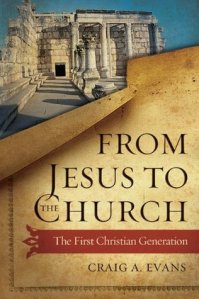I’m personally not a great fan of history. I find that having a deluge of dates, names and places rather intimating, and don't usually find myself reading any books on history. However, I was quite intrigued by the title of this book, plus it didn't seem to be a super thick book and thus attempted to read this book. I must say, this book has been very insightful and perceptive, I came away with a deeper appreciation of the early church history.
 Within this book you will find many helpful background info which you normally do not find elsewhere, for example there were many revolutionaries that had tried to revolt against the Rome governance. These revolutionaries, like Jesus, were often executed in the bid to stump the revolt, or are being intimated by the Rome governance. And these ‘solutions’ were often very effective in solving these problems.
Within this book you will find many helpful background info which you normally do not find elsewhere, for example there were many revolutionaries that had tried to revolt against the Rome governance. These revolutionaries, like Jesus, were often executed in the bid to stump the revolt, or are being intimated by the Rome governance. And these ‘solutions’ were often very effective in solving these problems.
Craig Evans first attempts to answer the question about the link between the temple (Jewish) and the Church (Christians), specifically, he wants to show the readers that the forecast of the destruction of the temple was one of the key prediction of Jesus judgement on the corrupt Jewish leaders and shows that Jesus does have the church in mind, but not in the same way as what we might often think. Evans handles this question very carefully, being careful to examine how the new testament authors used the words ‘synagoge’ or ‘ekklesia’ in their writings. Admittingly, I felt the first 2 chapters the most difficult to comprehend, but this is not due to any fault of the author!
Next, Evans examine how Jesus himself proclaims the kingdom of God, what he means by it. And how the Old Testament should shape our understanding of the concept of the kingdom of God. What is clear is that, this kingdom already has in mind the inclusion of the Gentiles even within the Old Testament. Therefore the inclusion of Gentiles into Christianity is not something novel, rather it is a outworking of what the Old Testament passages were writing about.
The third chapter talks about how James, rather than Peter was early church leader was exceptionally well written. In it, he interacts with Acts very well, and attempts to show that James was indeed the leader at that time. This was my first time hearing this, and I would have hope to see how Evans would have had attempt to explain John 1:42, where Peter is called the rock. Within this chapter, Evans also explains about the apparent ‘differences’ between James and Paul with regards the faith and work, and this was very well handled. This was the best chapter within the book and would be well-worth the price of the book.
Lastly, Evans ends by explaining why the church moved from a Jewish majority in the beginning to a Gentile majority thereafter, essentially the ‘stumbling blocks’ for the Jews to believe in the Risen Christ.
This book is exceptionally well-written and would be insightful for many. It has certainly helped me in my exegesis of the New Testament, being more careful to ask myself how would the first readers have understood this text. I do encourage pastors or motivated laypeople to read this book, and reap from the knowledge you would be able to gain from it.
Rating: 4 / 5
Disclaimer: I was given this book free from the publisher in exchange for an honest review.
If you're interested, you can get it here, and here (free international shipping), Kindle.
No comments:
Post a Comment